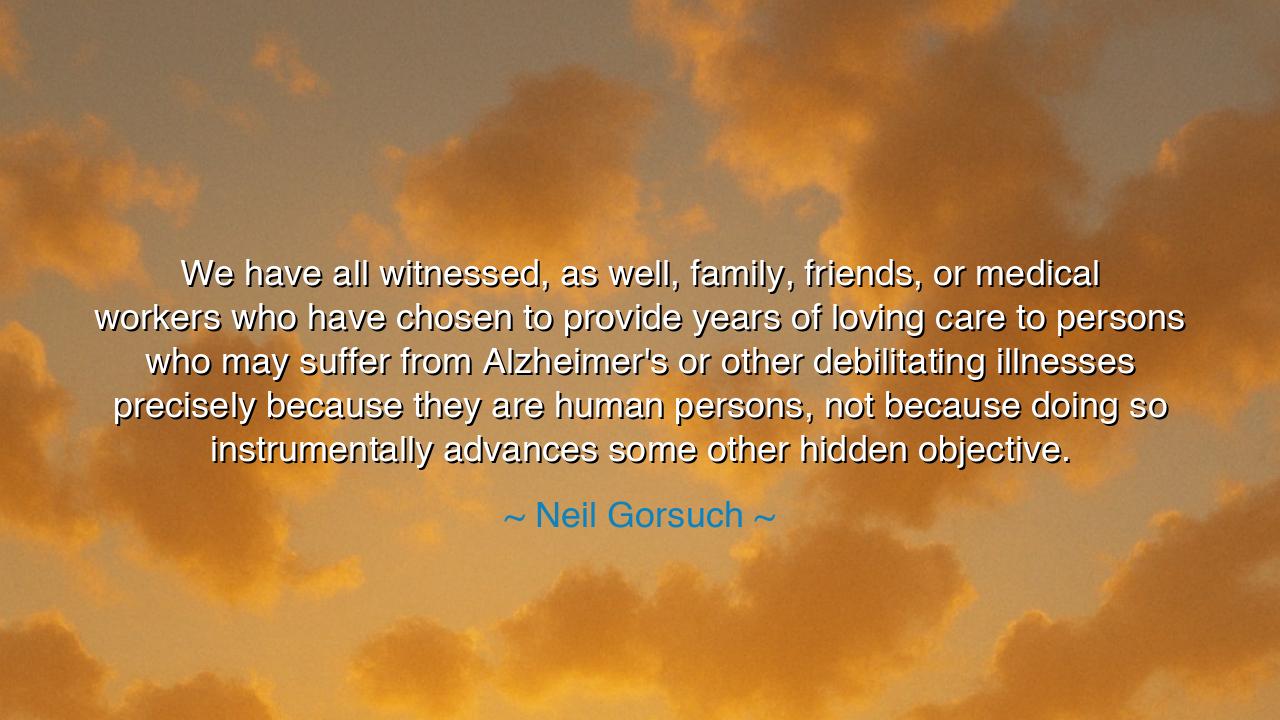
We have all witnessed, as well, family, friends, or medical
We have all witnessed, as well, family, friends, or medical workers who have chosen to provide years of loving care to persons who may suffer from Alzheimer's or other debilitating illnesses precisely because they are human persons, not because doing so instrumentally advances some other hidden objective.






Hear, O children of compassion, the solemn words of Neil Gorsuch: “We have all witnessed, as well, family, friends, or medical workers who have chosen to provide years of loving care to persons who may suffer from Alzheimer’s or other debilitating illnesses precisely because they are human persons, not because doing so instrumentally advances some other hidden objective.” These words are not simply a reflection on illness, but a meditation on the dignity of human life itself. They remind us that love given to the weak is not for gain or utility, but because each soul is worthy in itself.
The origin of this truth arises from the ancient moral teaching that humanity must never be reduced to mere means. To care for the suffering, to nurse the fading mind, to sit at the bedside of one who no longer remembers your name—this is not service rendered for profit or applause, but an act of reverence for the mystery of life. Gorsuch’s words recall this timeless principle: that in the face of decline and weakness, true humanity reveals itself not by turning away, but by remaining steadfast in love.
Consider the struggle of those who walk alongside the afflicted with Alzheimer’s. The illness strips memory, erases personality, and burdens both patient and family. Yet, how often have we seen children tending to parents, spouses refusing to abandon spouses, nurses patiently comforting day after day? They continue not because the sick can repay them, nor because society will honor them, but because the one they serve is a human person—an irreplaceable bearer of dignity. In such acts, the truest meaning of care is revealed.
History itself offers testimony. Recall the story of the early Christian communities in Rome. When plague swept through the city, many fled, abandoning even their kin. Yet the Christians remained, tending not only to their own, but to strangers. Their care was not strategic or calculated; it was born of a recognition that every life, even the broken and dying, is sacred. In this way, love became their testimony, and through love, their community grew. So too today, the families who remain faithful to the suffering bear witness to the eternal truth that dignity does not fade with illness.
The deeper meaning in Gorsuch’s words is a rebuke to the cold logic of utility. In a world that often measures worth by productivity, beauty, or strength, he reminds us that true worth is not earned but inherent. The human person is valuable not because of what they can do, but because of what they are. This recognition demands sacrifice, for to love the vulnerable is to walk a path of patience, sorrow, and endurance. Yet it is on this path that humanity shines most brightly.
The lesson for us is clear: when we encounter weakness, we must not turn away. The measure of our character is not how we treat the strong, but how we serve the weak. To provide care for the helpless is to affirm life itself. Let no one say, “This one is too far gone, this one no longer matters.” For in that denial, we would deny our own humanity. Each act of kindness given to the suffering is a stone placed in the foundation of a more just and compassionate world.
Therefore, O listeners, let your practice be this: give your time to those who cannot repay you. Visit the sick, encourage the weary, relieve the burdens of the caretakers who labor in silence. Speak words of dignity to those whose voices have been dimmed by illness. And above all, see in every person—whether strong or frail, brilliant or fading—the unshakable worth of a human person.
Thus let Gorsuch’s words endure: “We provide care because they are human persons, not because of some other objective.” This is the creed of compassion, the law of love that outlasts wealth, fame, and power. And if you live by it, your life, too, will be remembered not for what you gained, but for what you gave.






AAdministratorAdministrator
Welcome, honored guests. Please leave a comment, we will respond soon